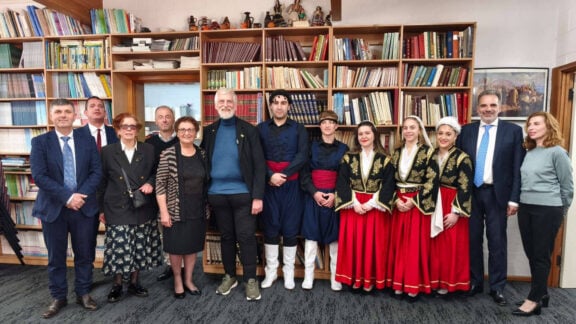The way the Greek people have preserved their ancient customs, transformed them into Christian ones, and maintained them over the centuries is admirable. These customs now travel around the world wherever Greeks live.
One of these customs is the celebration of Saint Haralambos, also known as the Bull Festival, which was organised this year by the Cultural Association of Agia Paraskevi Lesvos ‘Taxiarchis’ last Sunday, at the Lesvos Culture Club – Palesviaki Enosis of Melbourne and Victoria in Bayswater.
The festival, whose memory was brought by immigrants from the island of Lesvos, was revived this year at the estate of the Palaesvika Association. Despite the high temperature, attendees had the opportunity to worship the icon of the Saint at the chapel of the estate, admire the decorated bull and horses that were awarded, taste the ‘kiskek’ for free, enjoy traditional dances of Lesvos by the dancers of the dance academy ‘Pegasus’, of Sotiris Sotiriou, and under the cool shade of the trees, celebrate with live music orchestra, with musicians from Melbourne and Greece.

The President of the Association Georgios Anastopoulos, told Neos Kosmos that “we wish to keep our customs and traditions, to try to pass on this sense of tradition to our children, so that when we grow up, they can continue them.”
The day after the festival, the celebration continued honouring the tradition of ‘Harlamelia’ which took place at the restaurant Katialo in Oakleigh, with the participation of the same orchestra.

THE TRADITION
Saint Haralambos was a martyr and wonderworker from Asia Minor who lived and suffered during the years of the great persecutions of Christianity (1st-2nd century AD).
His sanctity is evident from the fact that many churches in our country bear his name, as well as cities that have declared him their patron saint.
Orthodox Christians venerate Saint Haralambos, connecting his miraculous actions with the protection against contagious diseases not only of humans but also of animals.
For this reason, farmers do not neglect his icon in their iconostasis and always turn to him for help, honoring his memory with customs that have been preserved over time for centuries.
In the island of Lesvos, in the grand village of Agia Paraskevi, the festival is an annual event, taking place at the chapel of the Saint, located atop the mountain, in the heart of the beautiful pine forest, which is one of the island’s treasures.

The customs accompanying the festival last for four days and include the ritual offering and sacrifice of the bull, the preparation and distribution of the traditional food ‘kiskek’, equestrian competitions, dance performances on horseback, and a celebration with live music in the village square.
Of course, there are also critics of these ancient customs, but they are usually ‘salon animal lovers’ who do not understand the deep relationship of interdependence and connection that farmers and animal breeders have with their animals, as well as the real, not just “philological respect” they have towards nature.

For this reason, the bull offered as a sacrifice-gift to the Saint is not mistreated.
It is “the fattened calf” that becomes the protagonist and object of admiration, as it is offered to the Saint adorned with a flowery wreath, colourful beads, scarves, and tassels, just as our ancient ancestors did thousands of years ago.
In addition to the bull, the co-stars of the custom are also the horses, which their owners also adorn, and with them participate in equestrian competitions and demonstrate their dancing abilities during the following celebration.










